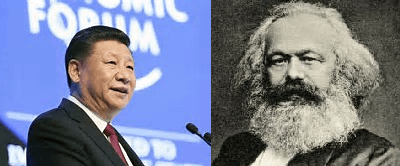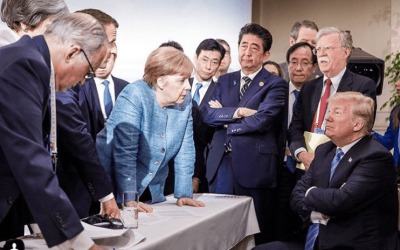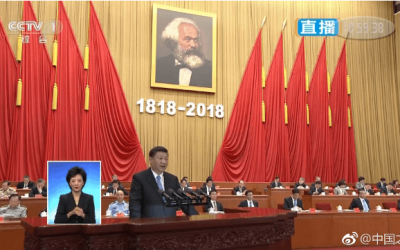Gallup carries out an annual international poll on approval of the leadership of major countries. This year’s poll, covering 134 countries, had a striking conclusion – China’s leadership has overtaken the US in approval not only globally but in every continent surveyed outside North America and possibly Australasia.
This is clearly a dramatic shift in international public opinion in favour of China compared to the US. This article therefore analyses Gallup’s findings and their implications.
Global result
Gallup found globally that median approval of the job being done by China’s leadership across all countries surveyed was 34% – rising from 31% during the past two years. US approval was only 31%, Approval of Russia’s leadership rose to 30%, only marginally behind the US. Overall approval of the US leadership was 31% with disapproval of 40%.
The highest international approval was for Germany, at 39% – although this was a decline from last year’s 41%. Germany, however, does not play the same overall major global geopolitical role as the US, China and Russia. Therefore, the primary focus here is on China, the US and Russia – Germany is then looked at in the context of Europe, in which it does play a key role.
The survey showed that approval of China’s leadership was higher than the US in every continent except North America, due there only to the position of the US, and possibly Australasia – for which Gallup does not give separate data. There were, however, significant differences between developing and advanced economies, and between different continents. The pattern of these, in turn, gives a clear insight into what creates approval and disapproval of countries.
Africa
Starting first with developing countries, Africa is the continent in which China has the strongest approval for its leadership – 53% approving, 16% disapproving, and net approval of 37%. In Africa approval of the US is also relatively strong, although weaker than China, with 52% approving, 19% disapproving, and a net approval of 33% – Africa is the only continent in which more countries approve of the US leadership than disapprove. Russia also has a net positive rating in Africa, although it is significantly lower than either China or the US at 16%.
Africa is unusual as it is the only continent in which China, the US, and Russia all have positive approval ratings. Africa clearly has high approval of outside major powers – with China occupying the number 1 position. The data is shown in Table 1.
Economically, all 34 countries polled in Africa are developing economies – the overwhelming majority, 30 out of 34, being in Sub-Saharan Africa. The average per capita GDP of Sub-Saharan developing economies in 2017, the latest available figure, is $3,803 in purchasing power parity (PPP) terms, that is at comparable international prices, and $1,554 at current exchange rates.

Asia and Australasia
Table 2 shows that Asia (including Australasia) is the continent in which China has the second highest net approval rating – 34% approving, 33% disapproving. Russia also has a positive overall rating. However, the US has a net disapproval rating of -6%. The ratings for the US are highly polarised, with strong approval of the US in countries such as Israel, Myanmar, Mongolia and Vietnam and strong disapproval in countries such as Turkey, Australia, Iran and Indonesia – twenty countries in Asia had net disapproval of the leadership of the US and 14 had net approval. Gallup does not give separate data for approval of China and the US in Australasia, so it is possible that approval for the US leadership in Australasia is higher than China although this is not at all certain in light of the extremely strong disapproval of the US leadership – net approval of the US leadership is -43% and in New Zealand it is -50%.
Of the 34 countries polled in the Asian and Australasian region 27 were developing economies and 7 were advanced economies. The developing economies were divided into two roughly equal groups – East Asia and the Pacific, with per capita GDP in 2017 of $13,576 in PPP terms, and $7,127 at current exchange rates, and South Asia with per capita GDP of $6,494 in PPP terms, and $1,840 at current exchange rates. An approximate average of the two regions would therefore be $10,035 in PPP terms and $4,483 at current exchange rates – i.e. significantly higher than sub-Saharan Africa.

Latin and North America
Africa and Asia are the only continents in which any of China, the US and Russia have net positive approval ratings. The difference in Latin America between the three major states is that, as Table 3 shows, there is only a mild net disapproval of both China (-3%) and Russia (-3%) but extremely strong disapproval of the US (-22%) – see Table 3. Only four relatively small countries in Latin America have net approval of the US (Haiti, the Dominican Republic, Paraguay, and Nicaragua) with 14 countries disapproving of the US leadership – including all the major Latin American countries such as Brazil, Argentina, Colombia, and Chile.
Although data is not given by Gallup it may be safely assumed that approval of the US leadership is higher in the US than in China – although Canada, has extremely strong disapproval of the US leadership with 16% approving, 79% disapproving, and a net disapproval of 63%. Given US dominance of North America this makes it the only continent in which approval of the US leadership is clearly higher than China.
Fifteen of the countries polled in the Americas were developing economies and five were advanced economies. The average per capita GDP of developing Latin American countries in 2017 was $13,620 in PPP terms and $8,313 at current exchange rates – i.e. significantly higher than developing economies in either Africa or Asia.
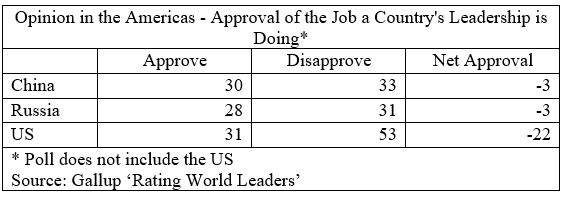
Table 4 shows that Europe is striking for the fact that China, the US, and Russia all have net disapproval ratings – in contrast to Germany which, as Table 5 shows, has an extremely strong net favourable rating of 31%. As already noted, Germany’s approval is positive in all continents, but outside Europe, where it is an extremely powerful force, Germany does not have an equal geopolitical impact to China, the US or Russia.
However, it is striking that there is much less disapproval of China in Europe than of either the US and Russia – China’s net approval rating is -16%, compared to the US -35%, and Russia’s -38%. This is a relatively favourable situation in terms of public opinion for China.
Seven of the countries polled in Europe were developing economies and 29 were advanced economies. The average per capita GDP of European and Central Asia, which includes Russia, in 2017 was $32,616 in PPP terms and $23,416 at current exchange rates. These figures, which are primarily for advanced economies, are, of course, far higher than those of developing economies in Africa, Asia or Latin America.

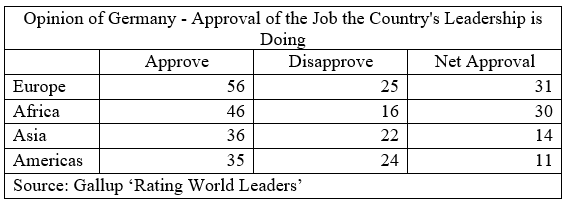
Conclusion
Numerous conclusions follow from Gallup’s data. But among the most important are:
- Approval of China is very clearly tied to the level of development of other economies compared to China. China’s per capita GDP in 2017 was $16,806 in PPP terms and $8,826 at current exchange rates – significantly higher than developing Africa or almost all developing Asia, approximately in line with Latin America, and significantly below Europe. Looking at the opinions shown in detailed studies of individual countries by Gallup, there are of course specific exceptional cases where other factors are dominant but in general countries with a lower per capita GDP than China, in Africa and Asia, have a favourable evaluation of China, countries in Latin America at approximately the same level of development have a very slightly unfavourable view of China, and there is a net unfavourable opinion from European countries with a higher per capita GDP. However, Europe is a good result within that overall framework, in that disapproval of China is significantly less in Europe than disapproval of the US and Russia.
- Such a clear relation between levels of economic development compared to China, and favourable or unfavourable attitudes to China, indicates clearly that it is the factor of the level of economic development compared to China, not non-economic issues such as Parliamentary democracy, that determines attitudes to China. Put in blunt terms, if a region is less economically developed than China it has a favourable perception of China, if a region is more economically developed than China it has an unfavourable attitude to China. Economic factors, not Western democracy or internet regulation are decisive in attitude to China. Put in other terms, it confirms that the basis of ‘soft power’ is ‘hard power’ – in this case the level of economic development.
- What is measured by
Gallup is the population’s opinion, not the position of governments. For
example, at present in Latin America, while popular opinion strongly
disapproves of the leadership of the US, a number of Latin American countries
have governments which are very pro-US – for example Brazil (where public
opinion disapproves of the US leadership by a net -14%), Ecuador (disapproves
of the US leadership by net -21%) and Argentina (disapproves of the US
leadership by a net -46%). Therefore, public opinion is one pressure in the
situation, but it is not the only one. It must be born in mind that
‘Western democracies’ governments very regularly ignore the views of the people
in whose name they claim to govern.
Finally, any attempt by the US media to say ‘international public opinion’ is against China is clearly false. Approval of China’s leadership has overtaken the US in all continents outside North America, with the possible, but not certain, exception of Australasia.
Of course, much work still needs to be done by China. China’s current favourable rating is greatly aided by the widespread extreme international disapproval of the present leadership of the US. But there is no doubt as to the overall situation – at present China is winning the battle for world public opinion against the US.


